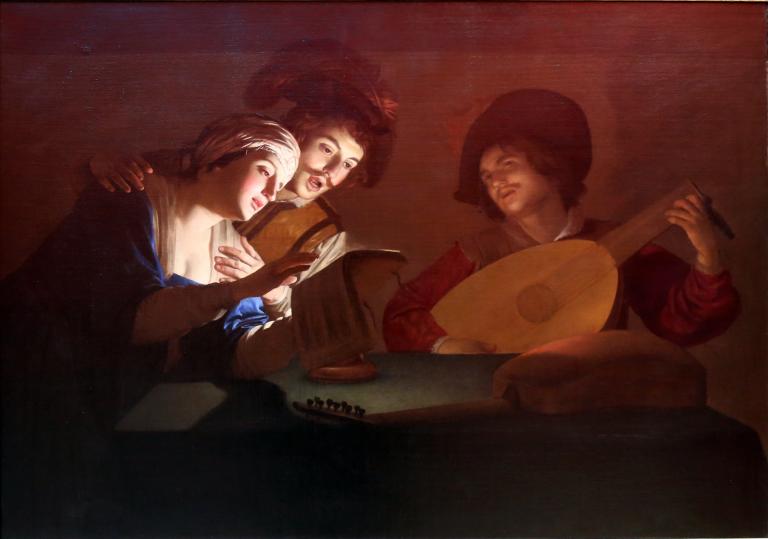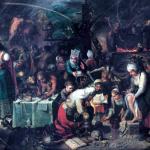Welcome to Conversations Under the Oaks, a monthly Q&A feature. This is your chance to ask me anything. This month we talk about journeying, dreams, panentheism, the acceptance of transgender people in Paganism (and the lack thereof), Modern Monetary Theory, and more.
Questions have been edited for brevity – names are used only where I have explicit permission.
Ana Simoes asks “You’ve spoken before about the importance of journeying, including to the Otherworld. You also stated you don’t write in-depth in regards to journeying through the Otherworld as it would most likely put less experienced people in danger, and pointed out these are teachings best passed on in person.
Do you believe it would be possible to pass this knowledge during online classes? Also, if doable, would you be willing to teach people that would, otherwise, hardly be able to learn how to?”
When I said I don’t write much about journeying because of the dangers to people who try it without proper guidance, I was only telling half the truth. The other half is that I’ve never really tried to teach it – in person or otherwise – so I don’t quite know how to teach it. It’s complicated by something we discussed in last month’s Q&A – some people can’t visualize. And visualization is my #1 technique for journeying. I know there are other techniques, but I don’t know them well enough to teach them.
I have some information on journeying in my second book. My editor was unhappy with my reluctance to go into depth, so I’m going to add more. But it won’t be tons more, and that book won’t be out till mid-2019.
I’ll refer you to my post from last year on journeying. I assume you’ve seen it, but it’s worth a review. Start with guided meditation. I have one in that post. Lora O’Brien has quite a few on her website. I’ve done a couple and I like them, plus she works from an Irish polytheist perspective. For a polytheist, that’s much better than some that are done from a Qabbalistic / Western Mystery Tradition context.
Once you learn to follow other people’s guided meditations, it becomes easier to dispense with the guide and go on your own; and then to move from meditation to journeying.
As for teaching online, I’m working on something similar with a small private group. If that goes well, I may make some of it public. But even if I do it won’t be any time soon.
Alexeigynaix asks “what are your thoughts on the intersections of art, activism, and devotional practice?”
This is a very timely and relevant question.
Devotion builds the foundation of our religions. It forms and strengthens our relationships with our God and ancestors, and with our most sacred values and virtues. It serves as a continuous reminder of what’s most important.
Art – which includes visual arts, music, poetry, the performing arts, and others – is how we express what we do in devotion and what we are devoted to. It speaks to us spiritually and emotionally, even if we don’t necessarily understand it intellectually. Good art will speak to people who shut off more direct messages – Evangelical Christians learned a long time ago that people will hear their message in gospel music when they’ll tune out a sermon (much to the annoyance of preachers everywhere).
Activism is how we embody the objects of our devotion in the material world. We begin by honoring Nature and then by feeling a closeness to Nature. We continue by working to preserve Nature, through conservation, through political action, and through changing the way we live.
We need all three in our lives, but at times like these art becomes more important. This is why dictators obsess over controlling art and restrict it to approved themes and forms. Art makes people feel – art inspires people to act.
Want to change the world? Make good art.

Kaifi J has a series of questions. “As the political and social climate becomes more harsh in the U.S. and world, what practices, both daily and long-term, would you recommend to preserve our sanity, well-being, and survival?”
Begin by maintaining the sovereignty of your mind: limit your news intake, dig for facts, and pay attention to framing. And commit to regular spiritual practice. I wrote this for the Winter Solstice in 2014 – it’s the best summary I’ve got.
“Is there something we can do to slow climate change?”
Slow? Yes. Stop? No. Do the obvious things: use less energy, especially energy from fossil fuels. But understand that the opportunity to prevent climate change is past. And also understand that the impact of individuals – even many individuals – will be insignificant without coordinated efforts to change behavior on a mass scale. And I do not think that will happen.
I hate to be a defeatist, but my personal preparations are on dealing with the impact of climate change – for myself and especially for the most vulnerable – not on preventing it.
“Do you recommend any particular method of divination that one can learn? I have a burgeoning interest in runes, without prior experience on them.”
I read Tarot. I learned Ogham for the OBOD Ovate grade, but never kept it up and promptly forgot it. There are many divination systems – pick the one that calls to you… and the one that you’ll practice regularly. If you feel called to runes, look around for educational resources, especially in Heathen communities.
“Is there a place for a panentheist theology in Druidry, next to a polytheist theology? I sometimes find inspiration in writings of historical Celtic Christian writers and Transcendentalists such as Emerson alongside more modern Pagan-polytheist sources.”
Druidry is a broad grouping of many different religious and spiritual approached. All of the things you list would be welcome in OBOD. In ADF, less so… though I doubt anyone would complain too loudly so long as you still honored a hearth culture and performed the Core Order of Ritual. I can’t speak for other Druid orders, though I suspect most of them would be open to this approach.
I’m not fond of panentheism. It strikes me as primarily a way to hang on to monotheism without keeping the Abrahamic baggage. Mainly, though, it doesn’t describe the world as we actually experience it. I much prefer polytheism, within a framework of the ultimate connectedness of all.
An anonymous reader asks “Have you heard of Modern Monetary Theory? Isn’t it obvious that it is in practice today? If the so-called conservative Republicans are purposely increasing the national deficit by trillions, then why should the rest of us be concerned about the deficit? Perhaps MMT is the way out of economic suffering.”
Modern Monetary Theory is the economic idea that since nations with their own currency can issue more at will, they cannot go bankrupt and they can fund government spending through currency creation rather than through (or in addition to) taxes and debt. It’s counterintuitive to those with a Dave Ramsey level understanding of finance (which, if you’re in the middle class makes good sense for personal finance), much less to those who are clinging to idea that there’s something sacred about the Gold Standard.
It can work because money is a representation of wealth and the West is wealthy beyond imagination, and because so much money is “sitting on the sidelines” because there are no attractive investment opportunities. During the Great Recession, the Federal Reserve pumped $4.5 trillion dollars into the economy through “quantitative easing.” Many people intuitively expected that to produce hyperinflation. It didn’t. Under standard economic theories, our current US national debt of $21 trillion should have bankrupted the country. It hasn’t and it won’t – unless it’s bankrupted on purpose.
So the Federal Government could simply issue money to pay for military spending, infrastructure, and transfer payments. So long as the money supply in circulation doesn’t exceed the total wealth of the nation (both public and private), inflation should remain under control. Under MMT, taxes and debt are used for fine tuning, not for financing collective spending.
This is not true for state and local governments. Unlike nations with their own currency, they’re bound by the same household finance limitations that restrict you and me.
The problem with MMT is that while wealth and the capacity to create new wealth are virtually limitless, individual resources are not. If the Navy gets new aircraft carriers and Trump get his wall and everybody gets enough to buy a new car, there will be a shortage of steel, and oil, and labor. And that will drive inflation, possibly back to the levels I remember from the 1970s.
Current Federal spending is financed by taxes and debt, not by MMT. Republicans have blown up the budget deficit because they like tax cuts and because they want to shrink the size of government, because they value small government over helping ordinary people.
MMT would work, within limits. It could be used to finance Universal Basic Income (UBI). I doubt it will, because the taxes and debt method is very old and politicians tend to be very conservative, even those who promote progressive policies. It’s counterintuitive, and would be a means of leveling inequality, which most Americans oppose. But it would work.
If you want to argue about this in the comments, be my guest. Economists far wiser than me disagree on MMT – there are valid arguments to be made on both sides. But bring facts and reasoning. Comments that dismiss it out of hand will be deleted, especially if they include name-calling.
“How can Pagans recognize and honor the aging process for men, and what are some things we can do cope with the reality of going from “young man” to “man” to “old man.”
That’s a good question, but a complicated one. I’m probably not the best person to answer it, because I don’t get the whole “men’s mysteries” thing.
I remember my first job out of college and wondering when I was finally going to feel like an adult. I changed jobs after two years, got married, built a house, and I still wondered when I was going to feel like an adult.
I’m 56 now. I’ve made three cross-country moves, I’ve managed people in my paying job for 25 years, I’ve traveled a fair amount… oh, and I’ve completely reworked my religious beliefs and practices.
I still don’t feel like an adult. I certainly don’t feel like a “man” – whatever that’s supposed to mean.
I’m starting to think there is no such thing as an adult. There are only people whose age puts them under certain legal restrictions, and people who are subject to a less formal set of restrictions.
Of course, my body has changed over the years. But physically, my prime years were 36 to 41, not my teens or 20s. I wrote this when I turned 50:
When I turned 40 I wrote in my journal “I still don’t think of myself in a significantly different way than I did when I was 22.” At 50, injuries and weight gain have stopped my running, I take daily medication for acid reflux, I need glasses to read, my beard is mostly white and the hairline that started receding in my late 20s is now racing backward.
I can’t kid myself any more – I’m getting old. Oh, I can still do almost anything I want, but not as fast or for as long, and recovering takes longer. Sometimes a lot longer.
At some point, though, this will change. There are some things I want to do that I need to do in the next few years, because while I can probably do them at 60 I may not be able to them at 70 and almost certainly can’t at 80.
If I can offer any advice, it’s to enjoy life as you live it, but don’t waste time. Whatever it is you want, go for it. If you find it’s not for you, accept that you’ve learned something valuable and then go do something else.
I don’t think I answered this question the way you asked it. I can offer no spiritual practices for aging, and I can’t tell you what it means to be a “man” because I don’t know. I can only tell you how I’ve lived my life and what I’ve learned along the way.
Good luck.
“I often wonder where Paganism is going to go as more and more gender-fluid, non-binary, and transgender people stop asking nicely for a seat in the tent and instead start to demand it. My liberal state of Massachusetts has a law protecting transgender rights, but there is a loud effort to repeal it. I wonder if something like that would happen in Pagan circles.”
While Pagans are generally well “ahead of the curve” on social issues, we are still part of the wider society, and like that wider society our community is struggling with non-traditional expressions of gender and identity. We have seen joyous acceptance, uneasy tolerance, and hateful bigotry – all from people who know first-hand what it’s like to be the target of oppressors. It’s a reminder that we are not as different as we like to think. That will change, with a lot of work. That work will take time, something we must both understand as a reality and refuse to accept as an excuse for not doing the right things now.
Some Pagan imagery and liturgy is extremely heteronormative and gender binary. We need not abandon myths that are deeply meaningful to us, we simply need to include imagery and liturgies that reflect other expressions of gender and identity. In some forms of Paganism, this is very easy. In others, it’s very hard. In all forms, it is necessary.
No one should have to demand a seat at the table. But when they do, our response should be to offer them a chair and say “we’re sorry – we’ll do better going forward.” And then do it.
Do you believe you can interact with the Otherworld through dreams? And if yes, how would you tell the difference between that and just the dream of the run of the mill variety?
I wrote about this last month in The Otherworld in a Dream – 4 Things I Learned. Yes, we absolutely can interact with the Otherworld in our dreams. And when I do, I intuitively know it’s not an ordinary dream. But I cannot describe how I know to my own satisfaction, much less to others.
It’s not lucidity – I’m rarely self-aware in my Otherworldly / prophetic dreams. It’s not the presence of Otherworldly persons – they show up from time to time in “routine sorting and filing” dreams. It’s not remembering them – though I always remember prophetic dreams, I remember a good portion of my ordinary dreams as well.
It’s more like the waking visions and other direct communications I receive at times. A thought pops into your head and you know – whether you want to accept it or not – that it’s important, and that it didn’t come from you. I don’t realize the dream has Otherworldly source while it’s happening, but as soon as I wake up I realize it does.
I wish I could give you a more direct answer, but that’s all I’ve got. When in doubt, do divination and see if your interpretation is confirmed or rejected.




















